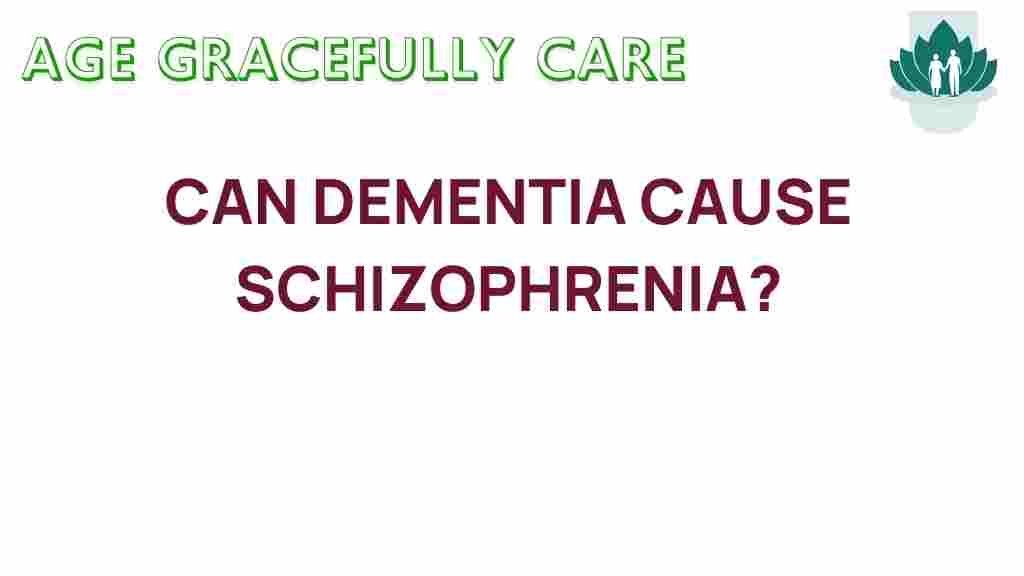Unraveling the Mystery: Can Dementia Trigger Schizophrenia?
Dementia and schizophrenia are two complex conditions that impact mental health significantly. While dementia is primarily known as a neurodegenerative disorder characterized by cognitive decline, schizophrenia is classified as a psychiatric disorder that severely affects how individuals think, feel, and behave. Given their distinct nature, one may wonder if there is a connection between dementia and schizophrenia and whether one can trigger the other. This article explores this intricate relationship, delving into symptoms, research, and the implications for brain health.
Understanding Dementia and Schizophrenia
Before exploring the potential connections between dementia and schizophrenia, it’s essential to understand each condition’s characteristics.
Dementia
Dementia is an umbrella term for various neurodegenerative disorders that lead to a decline in cognitive function. Common types of dementia include:
- Alzheimer’s disease
- Vascular dementia
- Lewy body dementia
- Frontotemporal dementia
**Symptoms of dementia** may include:
- Memory loss
- Difficulty communicating
- Disorientation
- Changes in mood and behavior
- Difficulty with problem-solving and planning
Dementia is progressive, meaning symptoms worsen over time, leading to significant impairment in daily functioning. Factors such as age, genetics, and lifestyle choices can contribute to the risk of developing dementia.
Schizophrenia
Schizophrenia is a chronic and severe mental health disorder that affects how a person thinks, feels, and behaves. Symptoms can be categorized into positive and negative effects:
- **Positive symptoms**: Hallucinations, delusions, thought disorders
- **Negative symptoms**: Lack of motivation, withdrawal from social life, emotional flatness
Individuals with schizophrenia often struggle with distinguishing reality from their distorted perceptions, which can lead to significant challenges in daily life. The onset of schizophrenia typically occurs in late adolescence or early adulthood, though it can develop later in life.
The Intersection of Dementia and Schizophrenia
While dementia and schizophrenia are different conditions, some research suggests a potential overlap in symptoms and underlying mechanisms. Understanding whether dementia can trigger schizophrenia involves exploring various factors, including:
- **Cognitive decline**: Both conditions involve cognitive impairment, though the nature and progression differ.
- **Age**: Older adults are at higher risk for both conditions, leading to the possibility of co-occurrence.
- **Genetic factors**: Certain genetic predispositions may increase the risk for both dementia and schizophrenia.
- **Environmental factors**: Stressful life events, substance abuse, and trauma may influence the development of both disorders.
Research Insights
Several studies have examined the relationship between dementia and schizophrenia, yielding mixed results:
Some symptoms of dementia, particularly in its later stages, can mimic those of schizophrenia. For instance, elderly patients with dementia may experience hallucinations or delusions, which can lead to misdiagnosis. Research indicates that:
- Approximately **30%** of dementia patients exhibit psychotic symptoms similar to schizophrenia.
- Misdiagnosis can delay appropriate treatment and worsen outcomes for patients.
Neurobiological Links
Neurobiological research has identified overlapping pathways in the brain that may influence both conditions:
- **Neurotransmitter imbalances**: Both schizophrenia and dementia may involve dysregulation of neurotransmitters like dopamine and serotonin.
- **Brain structure changes**: Imaging studies show that individuals with schizophrenia often have structural brain changes similar to those observed in dementia patients.
These findings suggest that while dementia does not directly trigger schizophrenia, the two disorders may share underlying neurobiological vulnerabilities.
Step-by-Step: How to Approach Symptoms
For individuals experiencing symptoms of either dementia or schizophrenia, a systematic approach to assessment and intervention is crucial. Here’s a step-by-step guide:
- Recognize Symptoms: Monitor cognitive and behavioral changes. Note any memory loss, confusion, or changes in perception.
- Consult a Healthcare Professional: Seek evaluation from a psychiatrist or neurologist who specializes in mental health and neurodegenerative disorders.
- Comprehensive Assessment: Engage in a thorough assessment, including cognitive tests, imaging studies, and medical history review.
- Develop a Treatment Plan: Collaborate with healthcare providers to create a personalized treatment plan that may include medication, therapy, and lifestyle changes.
- Monitor Progress: Regularly review and adjust the treatment plan based on the individual’s progress and any emerging symptoms.
Troubleshooting Tips for Caregivers
Caring for individuals with dementia or schizophrenia can be challenging. Below are some tips for caregivers:
- Educate Yourself: Learn about both conditions to better understand the challenges faced by the individual.
- Maintain Routine: Establish a daily routine to provide stability and predictability.
- Encourage Social Interaction: Foster social connections to reduce feelings of isolation and improve mental health.
- Practice Patience: Understand that cognitive decline and psychiatric symptoms can lead to frustration and confusion.
- Seek Support: Join support groups for caregivers to share experiences and coping strategies.
Conclusion
The relationship between dementia and schizophrenia is complex, with research indicating potential overlaps in symptoms, neurobiological mechanisms, and risk factors. While dementia does not directly trigger schizophrenia, the two conditions can coexist, particularly in older adults. Understanding the symptoms, seeking appropriate medical advice, and managing care can significantly impact the quality of life for those affected by these conditions.
For more information on mental health and neurodegenerative disorders, consider visiting the National Institute of Mental Health for valuable resources and support.
If you are a caregiver or a loved one of someone experiencing symptoms of dementia or schizophrenia, remember that you are not alone. There are numerous resources available, including therapy and support groups, to help navigate these challenging waters. For further reading on mental health, check out our article on understanding psychiatric disorders.
This article is in the category Health and created by AgeGracefullyCare Team
